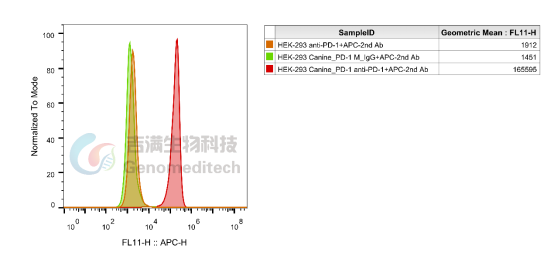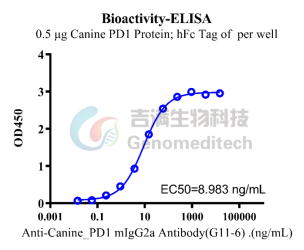Cat. No:GM-81957AB
Product:Anti-Canine_PD1 mIgG2a Antibody(4F12-E6)
Cat. No:GM-81957AB
Product:Anti-Canine_PD1 mIgG2a Antibody(4F12-E6)
GM-81957AB-10 10 μg
GM-81957AB-100 100 μg
GM-81957AB-1000 1mg
Species Reactivity Canine
Clone 4F12-E6
Source/Isotype Monoclonal human IgG1, κ
Application Flow cytometry; Bioactivity-ELISA
Specificity Detects PD1
Gene PD1
Other Names CD279, PD-1, PD1, SLEB2, hPD-1, hPD-l, hSLE1
Gene ID 5133(human)
Background PD1 (Programmed Death 1) is a cell surface receptor protein belonging to the immune checkpoint molecule family. It plays a crucial role in regulating immune responses. PD1 inhibits the activation and function of T cells by binding to its ligands PD-L1 (Programmed Death-Ligand 1) or PD-L2, thereby aiding in maintaining immune tolerance and preventing excessive immune reactions. Research on PD1 is primarily focused in the field of immunotherapy, particularly in cancer treatment. Inhibiting the interaction of PD1 or PD-L1 can restore the anti-tumor activity of T cells and is widely used in the research and clinical treatment of immune checkpoint inhibitors.
Storage Store at 2-8℃ short term (1-2 weeks).Store at ≤ -20℃ long term. Avoid repeated freeze-thaw.
Formulation Phosphate-buffered solution, pH 7.2.
Endotoxin < 1 EU/mg, determined by LAL gel clotting assay


Cat. No:GM-81957AB
Product:Anti-Canine_PD1 mIgG2a Antibody(4F12-E6)
GM-81957AB-10 10 μg
GM-81957AB-100 100 μg
GM-81957AB-1000 1mg
Species Reactivity Canine
Clone 4F12-E6
Source/Isotype Monoclonal human IgG1, κ
Application Flow cytometry; Bioactivity-ELISA
Specificity Detects PD1
Gene PD1
Other Names CD279, PD-1, PD1, SLEB2, hPD-1, hPD-l, hSLE1
Gene ID 5133(human)
Background PD1 (Programmed Death 1) is a cell surface receptor protein belonging to the immune checkpoint molecule family. It plays a crucial role in regulating immune responses. PD1 inhibits the activation and function of T cells by binding to its ligands PD-L1 (Programmed Death-Ligand 1) or PD-L2, thereby aiding in maintaining immune tolerance and preventing excessive immune reactions. Research on PD1 is primarily focused in the field of immunotherapy, particularly in cancer treatment. Inhibiting the interaction of PD1 or PD-L1 can restore the anti-tumor activity of T cells and is widely used in the research and clinical treatment of immune checkpoint inhibitors.
Storage Store at 2-8℃ short term (1-2 weeks).Store at ≤ -20℃ long term. Avoid repeated freeze-thaw.
Formulation Phosphate-buffered solution, pH 7.2.
Endotoxin < 1 EU/mg, determined by LAL gel clotting assay

